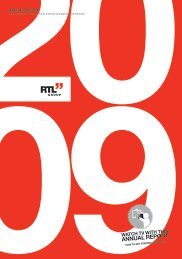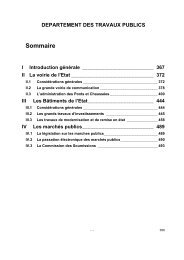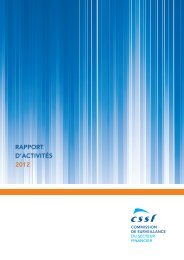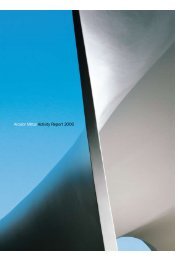Annual Report - paperJam
Annual Report - paperJam
Annual Report - paperJam
Create successful ePaper yourself
Turn your PDF publications into a flip-book with our unique Google optimized e-Paper software.
2010 also saw the Basel Committee agree on new capital and liquidity rules for banks; and this after<br />
only a bit more than a year of negotiations compared to the 5 years it took to reach an agreement on<br />
Basel II. The complete Basel III package will be gradually phased in until 2019. There is no doubt that<br />
Basel III will have a significant impact on global banking. Higher capital requirements and stricter liquidity<br />
rules will affect banks’ profit margins, and, together with other regulatory measures in the pipeline,<br />
they could have widespread and unpredictable effects on banks, but also on our economies. In any<br />
case, it is crucial that the new rules are globally implemented, and not just in Europe. Unlike for Basel II,<br />
the US seems to be on board for the implementation of the new rules this time around. But there is still<br />
a long way to go before Basel III is fully implemented.<br />
Healthy competition presupposes that everyone plays by the same rules. This is<br />
especially important when it comes to regulation. As a founding member of the<br />
European Union, Luxembourg has always known how to compete and prosper<br />
within a harmonised regulatory framework.<br />
However, the financial crisis has awoken a number of nationalistic and protectionist reflexes that many<br />
believed to have been discarded with the creation of a single market and increased globalisation. In the<br />
aftermath of the crisis, there has been a growing tendency to re-nationalise financial markets and repatriate<br />
clients’ assets.<br />
The ongoing discussions on the implementation of an automatic exchange of information<br />
in Europe are part of this trend. Not only would such an automatic exchange of<br />
information jeopardize a global level playing field to the advantage of non-EU financial<br />
centres, it would also discourage customer mobility and cross-border banking within<br />
the European Union itself.<br />
Indeed, the automatic exchange of information would only apply to non-resident clients. If customers<br />
keep their bank account in their own country, they are exempt, since in many countries tax authorities<br />
have no right to automatically receive account information from banks. Essentially, it would thus deter<br />
clients from opening an account in a country other than their own. That this goes against the fundamental<br />
EU rights of the free movement of people, capital and services is self-evident. Unfortunately,<br />
this is not how most other member states see it. While these countries have sizeable domestic markets<br />
of their own, Luxembourg relies on exporting its financial services. We can therefore not accept that<br />
data from Luxembourg banks is sent throughout Europe, simply because we happen to have a largely<br />
foreign clientele, while other member states mainly deal with domestic clients.

















